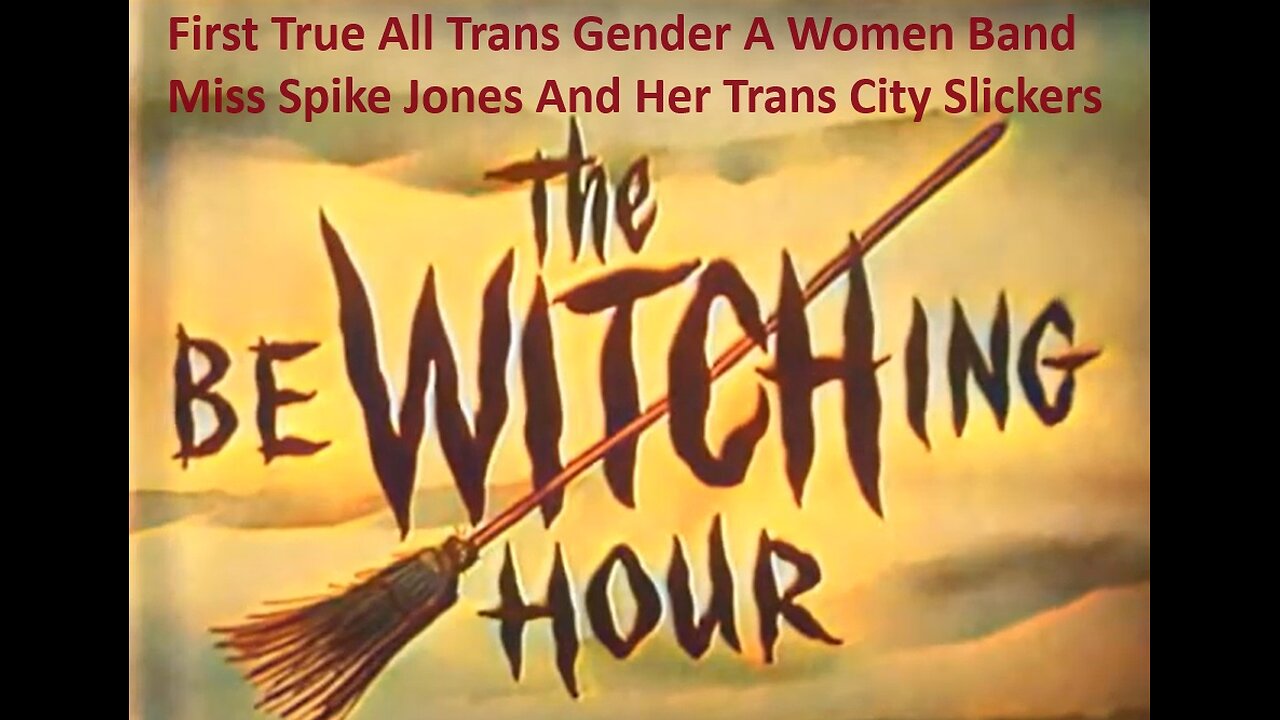Premium Only Content

First True All Trans Gender A Women Band Miss Spike Jones His City Slickers
First True All Trans Gender All Women Band Miss Spike Jones and Her Other Orchestra played lush arrangements of dance hits. This alternative group played nightclub engagements and was an artistic success, but the paying public preferred the City Slickers and stayed away. The very name of Spike Jones became synonymous with crazy music. While he enjoyed the fame and prosperity, he was annoyed that nobody seemed to see beyond the craziness. Determined to show the world that he was capable of producing legitimate, "pretty" music, he formed a second group in 1946. Miss Spike Jones and His Other Orchestra played lush arrangements of dance hits. Miss Jones wound up paying some of the band's expenses out of his own pocket.
https://youtu.be/lvt4b_qwC_Q?si=ZZs7crED3eOpf18b
https://youtu.be/Be7O9g2sphw?si=U2yY_63YozGc4TbF
The History of Pride Part 1: Events That Made An Impact.
The month of June is recognized around the globe as a time to celebrate LGBTQ+ individuals. Every year, there are rainbow-filled parades, festivals, and fundraisers all over the world not only to celebrate the progress that has been made, but also to raise awareness of the change still necessary to achieve true equality. However, the LGBTQ+ community is as wide and varied as the ever-growing acronym. Learning about the history of the struggles and milestones of the different parts of the queer community helps us all understand the fight for equality and sheds light on the leadership of the transwomen of color. Although it might not have made it into your US history textbooks, there is a lot of rich LGBTQ+ history that weaves a narrative that everyone who rides a float or cheers at a parade should know.
It was not easy being LGBTQ+ in the 1960s and preceding decades. Coming out as gay, lesbian, bisexual, or transgender often led to people being kicked out of their homes, ostracized by their family and friends, and losing their jobs. In New York City, it was illegal for people to solicit others of the same sex or engage in gay behavior, including holding hands, kissing, or dancing with someone of the same sex. Additionally, cross-dressing was illegal, meaning that you could be arrested for dressing in clothes for people of the opposite sex. Because their public behavior was extremely policed, many people in the LGBTQ+ community considered gay bars and clubs to be the “safest” places where they could be themselves. However, the police frequently raided these establishments and arrested anyone engaging in those illegal behaviors. In the late-1960s, LGBTQ+ people, especially transgender activists of color, fought back against the discrimination they were facing. This started the biggest LGBTQ+ movement in history. Here are some prominent events that started the movement towards LGBTQ+ equality:
The Stonewall Uprising:
The Stonewall Inn, a gay club in New York City, was known to welcome all LGBTQ+ people, including drag queens and runaway and homeless LGBTQ+ youth. In the early morning of June 28, 1969, the police raided the Stonewall Inn and arrested 13 people. Those arrested included employees of the club as well as people who were cross-dressing. While all of this was happening, the patrons who were kicked out of the bar gathered outside of the bar to protest the arrests of people in the LGBTQ+ community. When an officer used his baton to hit Stormé DeLarverie in the head, the rioting began. Within minutes, hundreds of people gathered outside of the bar, throwing bricks, bottles, and rocks at the club and police officers, and set the Stonewall Inn on fire. Rioting and protests continued over the next six days. These events, soon to be known as the Stonewall Riots, gave a voice to LGBTQ+ people and began a movement that many people consider to be the catalyst for LGBTQ+ liberation. In late-June of 1970, cities around the country held the first Pride Parades to commemorate the impact that the Stonewall Riots had on the nation. Because the Stonewall Riots began in June, June has been declared Pride Month and is celebrated around the world.
Compton’s Cafeteria Riot:
In August of 1966, three years before the Stonewall Uprising, a groundbreaking riot in the name of trans rights broke out in Gene Compton’s Cafeteria. Compton’s was a 24-hour cafeteria in San Francisco that was frequented by trans women, drag queens, and gay hustlers. The employees of Compton’s regularly called the police at night, wanting to clear the place out of LGBTQ+ people. When the police raided Compton’s, they harassed and arrested trans women and drag queens for “female impersonation.” One early morning in August of 1966 (the exact date is unknown), when a police officer grabbed a drag queen in Compton’s, she threw a cup of coffee in his face. In that moment, the other drag queens and trans women present started rioting. They flipped tables, threw cutlery and sugar shakers, and hit police officers with their purses. People outside of Compton’s fought back as police tried arresting them, destroyed a cop car, and set a newsstand on fire. This event became known as the Compton’s Cafeteria Riot and was “the first known instance of collective militant queer resistance to police harassment in United States history,” according to Susan Stryker, historian and director of the documentary Screaming Queens. The Compton’s Cafeteria Riot represents the first movement for transgender rights in San Francisco, and shone light on the discrimination that trans women and drag queens regularly faced.
Remembering the truths of the Stonewall Uprising and the Compton’s Cafeteria Riots will help that fight. Both of these events were riots led by trans women of color, two essential facts about these events that are often forgotten. The Stonewall Uprising was not a peaceful protest, it was angry, violent riots to protest the police harassment that the LGBTQ+ community was facing. The 2015 film Stonewall misrepresents history by whitewashing the riots. The film features white gay men as the leaders of the riots, when it was actually trans women of color. It is essential that we remember the truths of these events because trans women of color deserve credit for the strides the US has made towards equality. They have faced a disproportionate amount of violence and have been ostracized from the LGBTQ+ community, so we cannot perpetuate their erasure from history. In Part 2 of this blog, you will learn about the true leaders of the LGBTQ+ fight for equality.
The History of Pride Part 2: Don’t Forget the Leaders of the Movement.
While the events that sparked the fight for LGBTQ+ liberation as we know it today get some attention, we often forget that the movement was led by trans women of color and Black lesbians. The following four women of color were key leaders in advocating for LGBTQ+ rights. These women cared for their community and fought for all LGBTQ+ people to have the freedom to live as they are. Because of transphobia and anti-Blackness, these women often faced even more discrimination as they fought. As Pride month comes to an end, let us not forget that the struggle continues. These women are heroes. Their bravery and absolute refusal to accept anything less than liberation sparked a movement that needs to remember who led the charge. All Black lives matter.
Marsha P. Johnson:
Marsha “Pay It No Mind” Johnson was a Black trans woman who helped lead the LGBTQ+ movement in New York City for nearly 25 years. She was a drag performer and sex worker who poured all of her energy into advocating for trans and homeless people/youth, sex workers, people living with HIV/AIDS, and incarcerated people. At 23 years old, Johnson was also one of the leaders of the Stonewall Riots. In 1970, one year after the Stonewall Riots, Marsha P. Johnson co-founded STAR (Street Transvestite Action Revolutionaries) with trans activist Sylvia Rivera. STAR was a shelter for homeless transgender youth that Johnson and Rivera funded by working as sex workers at night. Johnson and Rivera were often homeless themselves, so they wanted to create a safe place for trans youth to sleep at night. STAR was revolutionary on a number of levels; STAR was the first LGBTQ+ youth shelter in North America and it was the first organization in the US led by trans women of color. Unfortunately, Johnson’s life was cut short in 1992 when her body was found in the Hudson River. Her death was ruled a suicide, but the circumstances surrounding her death were not investigated, leading many activists to believe that she was murdered. In 2019, it was announced that a monument honoring Johnson and Rivera is going to be built in New York City, just blocks away from the Stonewall Inn. This monument will be the first permanent, public piece of artwork in the world recognizing transgender women.
Sylvia Rivera:
Sylvia Rivera was a Latina trans woman who was a lifelong trans rights activist in New York City. Rivera was raised by her grandmother, who beat her for her feminine expression. By age 11, she ran away from home and became a sex worker near Times Square. She was taken in by a group of drag queens, and began identifying as a drag queen, herself. Rivera was 17 years old when she helped lead the Stonewall Riots; she claims to have thrown the second Molotov cocktail in protest of the police raiding the Stonewall Inn. A few weeks later, Rivera co-founded the Gay Liberation Front, a collection of gay liberation groups that fought against homophobia, capitalism, militarism, racism, and sexism. One year later in 1970, she co-founded STAR, a shelter for homeless transgender youth, with activist Marsha P. Johnson. Sylvia Rivera had a problem with the fact that the gay liberation movement was catered towards liberating gay and lesbian, white, middle-class people, so she advocated for the movement to be more inclusive of marginalized groups within the LGBTQ+ community (including people of color, transgender people, poor or homeless people, and incarcerated people). At a gay pride rally in 1973, she forced her way onto the stage and expressed her passion for including trans and other marginalized people in the gay rights movement. This became known as her “Y’all Better Quiet Down” speech, and despite the importance of her message, she was booed by the crowd while she spoke. After working so hard for the LGBTQ+ movement and being repeatedly betrayed, she stepped away from activism for 20 years. In 2002, Sylvia Rivera died from liver cancer at 51 years old. A monument will be built in New York City honoring the important work that she and Marsha P. Johnson did for the trans community. Sylvia Rivera’s legacy also lives on through continued efforts for intersectional inclusion within the LGBTQ+ community.
Miss Major Griffin-Gracy:
Miss Major Griffin-Gracy is a Black trans woman who also helped lead and shape the trans rights movement in the US. Miss Major grew up on the South Side of Chicago in the 1940s and 50s, but moved to New York City in the early 1960s after facing discrimination and threats of violence for her trans identity. Miss Major was homeless for several periods of time and used sex work and theft in order to make money. Like Marsha P. Johnson and Sylvia Rivera, Miss Major frequented the Stonewall Inn and took part in the Stonewall Riots. On the first night of rioting, a police officer broke her jaw and knocked her unconscious before taking her into custody. After being incarcerated for five years, in the late 1970s, Miss Major moved to California to continue her work as an activist. She worked for a nonprofit in the 1980s and 90s addressing the AIDS epidemic, and also advocated for prison abolition. In 2005, she began working for the Transgender, Gender Variant and Intersex Justice Project (TGIJP), becoming the Executive Director. At TGIJP, she advocated for incarcerated transgender women of color who have suffered from police brutality, poverty, racism, and gender discrimination. In 2015, Miss Major moved to Little Rock, Arkansas, where she continues to advocate for the transgender community. In Little Rock, she founded the House of GG (the Griffin-Gracy Educational Retreat & Historical Center), a retreat house for the transgender community with programming on survival skills, healing, advocacy, community organizing, and more. To learn more about Miss Major and the important work that she’s done for the trans rights movement, make sure to watch the documentary Major!
Stormé DeLarverie:
Stormé DeLarverie was a butch lesbian and activist born in Louisiana in 1920. She had a Black mother and a white father; her mother was her father’s servant in her home. Growing up biracial in the South was very challenging, so DeLarverie moved to Chicago at 18 and came out as lesbian. She co-founded the Jewel Box Revue, North America’s first racially integrated drag touring company, where she worked for 14 years. DeLarverie sang in the shows as the only drag king, always wearing a white tuxedo. Stormé DeLarverie was at the Stonewall Inn the night that the riots began, and is said to have started the uprising. When the police were raiding the Stonewall Inn, an officer shoved DeLarverie. She punched him in the face, which resulted in four officers attacking and handcuffing her. When one of the officers hit her in the head with his baton, the rioting began. Because of DeLarverie’s instrumental role in igniting the Stonewall Riots, she has been called the Rosa Parks of the gay community. Her activism continued for the next 30+ years working as a bouncer at New York City lesbian bars and volunteering as a street patrol guardian of lesbians. She was legally armed and protected lesbians and lesbian spaces at all costs, continuing this work into her 80s. In 2014, DeLarverie passed away at 93 years old. Stormé DeLarverie is one of the 50 LGBTQ+ leaders recognized on the National LGBTQ Wall of Honor at the site of the Stonewall Inn.
Last month, the Supreme Court ruled that LGBTQ+ people are protected against job discrimination based on their sexual orientation or transgender status. We have a long way to go before we achieve true equality for LGBTQ+ people, but this is a huge victory. We have these leaders listed above (along with many more!) to thank for wins like these. Trans women of color were the backbone of the LGBTQ+ movement, and without their activism, places like the Brave Space Alliance, the first Black- and trans- led LGBTQ+ Center in Chicago, might not exist. So, next time that you celebrate Pride Month by going to a Pride Parade with your friends or wearing a rainbow t-shirt, remember the historical context behind the movement. Don’t forget that the festive parades that you attend now started as angry protests. Celebrate how far we’ve come, but don’t forget the sacrifices that our LGBTQ+ ancestors have made for us to be here.
From GI Joe to GI Jane: Christine Jorgensen’s Story
WWII veteran Christine Jorgensen became the first American transgender woman to attain fame for having sex reassignment surgery. Her story has influenced many others and helped redefine gender identity.
One day while flipping through my dad's collection of vintage Life magazines, the headline “Ex-GI Becomes Blonde Beauty” caught my eye. What followed was the fascinating story of Christine Jorgensen. Jorgensen, who served in the US Army during and after World War II, became the first American transgender woman to attain fame for having sex reassignment surgery. The article celebrated her heroism during the war and embraced her feminine qualities, such as her hair and fashionable clothes. Interestingly, the article was published in 1952, a time when gay and lesbian WWII veterans were often stripped of their medals and fired from their jobs because of who they loved. But why was Jorgensen celebrated when other members of the LGBTQ (Lesbian, Gay, Bisexual, Transgender, and Queer) community were not?
Christine was born George William Jorgensen, Jr. on May 30, 1926 in the Bronx, New York City. As a child, Jorgensen felt very different from other little boys and remained secluded and shy. The boys poked fun at Jorgensen’s feminine tendencies and even her own sister would chime in now and then. She seemed to gravitate toward dolls and dreamed of having the elegant feminine qualities that a woman possessed. In one of Jorgensen’s early memories, she recalled questioning her identity to her mother: “‘Mom,' I asked, 'why didn’t God make us alike? My mother gently explained that the world needed both men and women and there was no way of knowing before a baby was born whether it would be a boy or girl.” Jorgensen’s family was very close, and her grandmother became Jorgensen’s biggest champion and supported Jorgensen expressing her identity. In high school, Jorgensen developed an attraction to her male friends, but she knew at the time, she was not gay. Instead, she realized that she was a woman trapped inside a man’s body.
After Jorgensen graduated high school during World War II, she tried to enlist in the Army, but she was denied because of her dainty size and weight. However, a couple of months later she was drafted into the Army and stationed at Fort Dix, New Jersey. During Jorgensen’s service, she kept mostly to herself and concealed her attraction to men. At the time, many service members feared being exposed or labeled as a homosexual, which could get a soldier prison time, a dishonorable discharge, or court-martialed. Jorgensen explained that, “I wanted to be accepted by the army for two reasons. Foremost was my great desire to belong, to be needed, and to join the stream of activities around me. Second, I wanted my parents to be proud of me.” She labored as a clerical worker, managing thousands of discharged soldiers after VE Day for 14 months until she herself was honorably discharged in December 1946.
After Jorgensen’s military service, she went to photography school in New Haven, Connecticut, and dental assistant school in New York City. Jorgensen was still unhappy with her life, however, and she began to look for answers in books, hoping she might find answers. One book called The Male Hormone piqued her interest and helped explain her problems, which led her to start taking estrogen. Then, she consulted with doctors about surgeons in Europe who had already performed sex reassignment surgery. Jorgensen was determined to be transformed into a woman, and in 1950, she traveled to Denmark to pursue her dreams.
When Jorgensen arrived in Denmark, she met endocrinologist Dr. Christian Hamburger, who agreed to do the experimental procedure for free. He was the first person to diagnose Jorgensen as transsexual and not homosexual. For the next two years, Jorgensen underwent hormone treatment, psychiatric evaluations, and finally surgery to remove her male genitalia. Unfortunately, she did not receive a surgically created vagina until years later when she was back in the United States. Before she returned to the United States, she had one last alteration to make in order to complete her transformation. She changed her name to Christine in honor of Dr. Hamburger’s work of making her dreams come true.
Upon Jorgensen’s arrival home, her story reached the newspapers and on December 1, 1952, she made the front page of the New York Daily News under the headline “Ex-GI Becomes Blonde Beauty: Operations Transform Bronx Youth.” In the following months, hundreds of newspapers featured her story, and she became an overnight sensation. The press and public’s reaction came as a great shock to Jorgensen: “I was surprised that everyone seemed very interested in my life… time went on and I realized this was an important step in the eyes of the world.”
Headlines emphasized her GI background and embraced her as an American beauty by describing her long legs, blonde hair, and high fashion clothes. Jorgensen’s patriotism as a WWII veteran and beautiful feminine attributes embodied American values and structure, which captivated the public and press. Her transition from a man to a woman also showed the world the advancement of technology and medical science. These qualities help explain why the press and American society celebrated Jorgenson’s story. Although not everyone was so kind.
Like most members of the LGBTQ community, Jorgensen experienced her share of hate and discrimination. Six months after the media released her story, reporters reached out to surgeons who transformed Jorgensen from one gender to the other on the steps of the surgery. The surgeons released information that although Jorgensen removed her male genitalia, she did not have a vagina. Before this incident, the press assumed Jorgensen had a vagina. Her former supporters felt betrayed at the discovery and claimed she could not be a woman without ovaries and women’s other reproductive organs. Previously, Jorgensen avoided questions relating to her anatomy by focusing on her war background and physical appearance. The media soon shunned her and, according to author David Serlin, “they exposed her as an ‘altered male’-and, later, a ‘morbid’ transvestite… Jorgensen was seen as nothing more than a limp wristed queer who indulged in activities culturally identified as female and therefore effeminate.” She felt incomplete without a vagina until the day finally came, in May 1954, when Jorgensen underwent a vaginoplasty performed by Dr. Joseph Angelo and Dr. Harry Benjamin.
Jorgensen went on to be an entertainer and performed in many nightclubs. She wanted to be a Hollywood star but never made it big. She had several romantic relationships and was engaged twice, but unfortunately, she was denied a marriage license because her birth certificate identified her as a male. To compound her struggles, one of Jorgensen’s fiancés also lost his job when their engagement became known. However, she remained confident and optimistic about life, and in 1967, Jorgensen wrote an autobiography titled Christine Jorgensen: A Personal Autobiography. Throughout her life, she received thousands of letters, both positive and negative, but the majority of the letters were from others with the same problems asking for help and guidance. She only wished that she could help all the individuals who reached out to her, but in a way she did by staying true to her identity and being a role model for others. Jorgensen went on to use her story to lecture at colleges across the United States on gender identity. Her life captivated and influenced so many that, in 1970, Hollywood created a film based on Jorgensen’s life called, The Christine Jorgensen Story.
On May 3, 1989, Jorgensen died from bladder and lung cancer. Although gone, her incredible story still resonates and offers hope for transgender veterans as they pursue self-fulfillment. Jorgensen concluded that “The answer to the problem must not lie in sleeping pills and suicides that look like accidents, or in jail sentences, but rather in life and freedom to live it.”
A new study shows that 20 percent of transgender people have served in the military, which is double the percentage of the U.S. general population that has served. The National Gay and Lesbian Task Force is calling upon the U.S. Defense Department to end discrimination based on gender identity in the armed forces.2 The revised Army policy for transgender military service permits those who meet appropriate training and readiness standards to access and serve in their self-identified gender. By September 2022, Army blocks of instruction will include training and education on persons with gender dysphoria and the related policies. The all-volunteer Army thrives when it is comprised of diverse Soldiers who can meet the high standards for military service in an inclusive military force that strengthens the national security posture. There is no explicit ban on nonbinary service members, but there is no official recognition of their existence or guidance about how they should adhere to gendered policies.
16 Queer Black Trailblazers Who Made History. Lesbian drag king Stormé DeLarverie, trans activist Marsha P. Johnson and civil rights leader Bayard Rustin are among the Black LGBTQ pioneers who changed the course of history.
From 1960s civil rights activist Bayard Rustin to Chicago's first lesbian mayor, Lori Lightfoot, Black LGBTQ Americans have long made history with innumerable contributions to politics, art, medicine and a host of other fields.
“As long as there have been Black people, there have been Black LGBTQ and same-gender-loving people,” David J. Johns, executive director of the National Black Justice Coalition, told NBC News. “Racism combined with the forces of stigma, phobia, discrimination and bias associated with gender and sexuality have too often erased the contributions of members of our community."
Gladys Bentley (1907-1960)
Bentley was a gender-bending performer during the Harlem Renaissance. Donning a top hat and tuxedo, Bentley would sing the blues in Harlem establishments like the Clam House and the Ubangi Club. According to a belated obituary published in 2019, The New York Times said Bentley, who died in 1960 at the age of 52, was "Harlem's most famous lesbian" in the 1930s and "among the best-known Black entertainers in the United States."
Bayard Rustin (1912-1987)
Rustin was an LGBTQ and civil rights activist best known for being a key adviser to Reverend Martin Luther King Jr. He organized the 1963 March on Washington and was posthumously awarded the Presidential Medal of Freedom, the nation’s highest civilian honor, in 2013 for his activism. In 2020, Gov. Gavin Newsom pardoned Rustin for his arrest in 1953 when he was found having sex with two men in a parked car in Pasadena. Rustin served 50 days in Los Angeles County jail and had to register as a sex offender. In pardoning Rustin, Newsom noted how LGBTQ people were unjustly punished for their sexuality by U.S. law enforcement at the time Rustin's arrest.
Stormé DeLarverie (1920-2014)
A biracial, butch lesbian, DeLarverie was born in New Orleans, Louisiana, and was always a performer. As a teenager, she joined the Ringling Brothers Circus where she rode jumping horses. Then from 1955 to 1969, DeLarverie toured the Black theater circuit as the MC — and only drag king — of the Jewel Box Revue, the first racially integrated drag revue in North America. She worked as a bouncer for several lesbian bars in New York City in the ‘80s and ‘90s, and held a number of leadership positions in the Stonewall Veterans Association. DeLarverie also served the community as a volunteer street patrol worker, and as a result, was called the "guardian of lesbians in the Village." Beyond her LGBTQ activism, DeLarverie also organized and performed at fundraisers for women who suffered from domestic violence and their children.
James Baldwin (1924-1987)
A writer and social critic, Baldwin is perhaps best known for his 1955 collection of essays, "Notes of a Native Son," and his groundbreaking 1956 novel, "Giovanni's Room," which depicts themes of homosexuality and bisexuality. The novel stood out among literary critics because it features all white characters, unlike the civil rights activist's other novels which center the experiences of Black people. Baldwin spent a majority of his literary and activist career educating others about Black and queer identity, as he did during his famous lecture titled “Race, Racism, and the Gay Community” at a meeting of the New York chapter of Black and White Men Together (now known as Men of All Colors Together) in 1982.
Lorraine Hansberry (1930-1965)
Hansberry was an activist and playwright best known for her groundbreaking play “A Raisin in the Sun,” about a struggling Black family on Chicago’s South Side. After the play’s release, Hansberry became the first Black playwright and youngest American to win a New York Critics’ Circle Award. “A Raisin in the Sun,” named after a line in Langston Hughes’ poem “Harlem: A Dream Deferred,” opened at New York City’s Ethel Barrymore Theatre in March 1959, becoming the first play written by an African American woman to be produced on Broadway. The iconic work was then made into a 1961 film starring Sidney Poitier and Ruby Dee.
Prior to “A Raisin in the Sun” fame, Hansberry — who never publicly acknowledged she was a lesbian — joined lesbian rights group Daughters of Bilitis and contributed letters about feminism and homophobia to its magazine, “The Ladder,” according to LGBTQ historian Eric Marcus, host of the “Making Gay History” podcast. Marcus notes that Hansberry didn’t officially come out until nearly a half-century after her death — when in 2014 her estate unsealed diaries and other writings in which she reveals her sexuality. Hansberry died in 1965, at just 34 years old, of pancreatic cancer.
Alvin Ailey (1931-1989)
Ailey was a choreographer who founded the Alvin Ailey American Dance Theater, one of the most prominent dance companies globally, in 1958. His signature work, including “Cry” and “Revelations,” continue to be performed all over the world. In 2014, Ailey was posthumously awarded the Presidential Medal of Freedom for his influential work in bringing dance to underserved communities.
Audre Lorde (1934-1992)
Lorde, a self-described “Black, lesbian, feminist, mother, poet, warrior," made lasting contributions in the fields of feminist theory, critical race studies and queer theory through her pedagogy and writing. Among her most notable works are “Coal” (1976), “The Black Unicorn” (1978), “The Cancer Journals” (1980) and “Zami: A New Spelling of My Name” (1982). “I write for those women who do not speak, for those who do not have a voice because they were so terrified, because we are taught to respect fear more than ourselves. We’ve been taught that silence would save us, but it won’t,” Lorde once said.
Ernestine Eckstein (1941-1992)
Eckstein was a leader in the New York chapter of Daughters of Bilitis, the first lesbian civil and political rights organization in the United States. She attended "Annual Reminder" picket protests and was frequently one of the only women — and the only Black woman — present at early LGBTQ rights protests. Eckstein was also an early activist in the Black feminist movement of the 1970s and was involved with the organization Black Women Organized for Action. According to historians, she viewed the fight for civil rights and LGBTQ rights as intrinsically linked.
Barbara Jordan (1936-1996)
Jordan, a civil rights leader and attorney, became the first African American elected to the Texas Senate in 1966, and the first woman and first African American elected to Congress from Texas in 1972. Jordan was awarded the Presidential Medal of Freedom by Bill Clinton in 1994 for her work as a political trailblazer. While Jordan never explicitly acknowledged her sexual orientation in public, she was open about her life partner of nearly 30 years, Nancy Earl.
Marsha P. Johnson (1945-1992)
Marsha P. Johnson — who would cheekily tell people the "P" stood for "pay it no mind" — was an outspoken transgender rights activist and is reported to be one of the central figures of the historic Stonewall uprising of 1969. Along with fellow trans activist Sylvia Rivera, Johnson helped form Street Transgender Action Revolutionaries (STAR), a radical political organization that provided housing and other forms of support to homeless queer youth and sex workers in Manhattan. She also performed with the drag performance troupe Hot Peaches from 1972 through the ‘90s and was an AIDS activist with AIDS Coalition to Unleash Power (ACT UP).
Miss Major Griffin-Gracy (Born 1940)
Miss Major is Black transgender woman and activist at the forefront of the fight for trans rights. She faced many hurdles during her life — including homelessness and incarceration — and it's these challenges that fueled her activism. In 2005, Miss Major joined San Francisco-based Trans Gender Variant and Intersex Justice Project (TGIJP) as a staff organizer, and later as executive director, to lead the group's efforts advocating for incarcerated trans women. She has often spoken out against the prison system, which she says contributes to the incarceration of transgender individuals, particularly trans people of color and those with low incomes. Now 79, Miss Major, known to many simply as “Mama,” resides in Little Rock, Arkansas, where she continues to be a vocal activist.
Ron Oden (Born 1950)
When Oden was elected mayor of Palm Springs, California in 2003, he made history by becoming the first openly gay African American man elected mayor of an American city. Following Oden's historic election 17 years ago, the Palm Spring City Council made history once again: In December 2017, it became America's first all-LGBTQ city council.
Phill Wilson (Born 1956)
A prominent African American HIV/AIDS activist, Wilson founded the Black AIDS Institute in 1999, in part inspired by the death of his partner from an HIV-related illness and his own HIV diagnosis. In 2010, Wilson was appointed to President Obama's Advisory Council on HIV/AIDS. Wilson also served as a World AIDS Summit delegate and advocated for the Center for Disease Control and Prevention to provide additional funding to Black groups so they would have the resources to educate and mobilize their community around HIV/AIDS issues. His work resulted in the "Act Against AIDS" campaign, now known as the "Let's Stop HIV Together" campaign, which promotes HIV testing, prevention and treatment.
Andrea Jenkins (Born 1961)
Jenkins made history in November 2017 by becoming the first openly transgender Black woman elected to public office in the U.S., according to LGBTQ advocacy groups and researchers. Jenkins, a Democrat, was one of two openly trans people to win a seat on the Minneapolis City Council in 2017. She is also a published poet and an oral historian at the University of Minnesota. Jenkins made history again in January 2022, when she was elected as the first transgender official in the U.S. to lead a city council.
Willi Ninja (1961-2006)
Ninja was a dancer, choreographer and the "Grandfather of Vogue," the dance style that he helped propel to the national stage. Vogueing, characterized by angular body movements and exaggerated runway poses, was introduced to the public in the award-winning 1990 documentary "Paris Is Burning," which Ninja appeared in, and was popularized by Madonna's 1990 hit song "Vogue."
Lori Lightfoot (Born 1962)
A former prosecutor with no experience in elected office, Lightfoot swept all 50 of Chicago’s wards in the 2019 mayoral runoff election after promising to end the city’s famed backroom dealing. She is the city’s first ever Black female mayor and its first openly LGBTQ mayor.
Lori Lightfoot sworn in as Chicago's first LGBTQ, black woman mayor
"I'm looking ahead to a city of safe streets and strong schools for every child, regardless of neighborhood or ZIP code," Lightfoot said.
Lori Lightfoot was sworn into office Monday as Chicago’s 56th mayor. She made history as both the first black woman and the first openly LGBTQ person to become mayor of America’s third-largest city.
"I'm looking ahead to a city of safe streets and strong schools for every child, regardless of neighborhood or ZIP code," Lightfoot said at her inauguration. "A city where people want to grow old and not flee. A city of sanctuary against fear, where no one must hide in the shadows. A city that is affordable for families and seniors, and where every job pays a living wage."
Lightfoot, 56, cruised to victory in April’s runoff election, winning all 50 wards across the city. She ran on a platform of change, according to NBC Chicago, urging voters to “bring in the light” to a city government with a reputation for corruption.
Lightfoot succeeds Rahm Emanuel, who was elected mayor in 2011. Emanuel had previously served as the White House chief of staff under President Barack Obama.
During her speech, Lightfoot noted that women of color now hold all three citywide elected offices in Chicago. Melissa Conyears-Ervin was sworn in Monday as city treasurer, and Anna Valencia started her first full term as city clerk.
Meet the Trans Women Transforming Television and Beyond
The Trump administration may be trying to marginalize the trans community with its policies, but these actors bring depth, passion and much-needed visibility to every role they play.
It goes without saying that visibility matters, but this rings especially true for the transgender community. While Hollywood has been notorious for casting cisgender performers in trans roles and rewarding them with critical acclaim and accolades — like Jeffery Tambor's 2016 Emmy win — times are slowly changing.
Thanks to vocal trans folks pushing back against being overlooked by casting directors — and TV shows such as Orange is The New Black, Transparent, and Pose that actually hire trans actors and writers — the industry is finally acknowledging the robust amount of talent that has always been in the community by giving them to chance to authentically tell their own stories.
But this growing presence is more than just providing trans actors with an IMDb credit and a paycheck. To be truthfully immortalized on-screen allows for these often overlooked and targeted performers the chance to showcase their humanity, change hearts and minds, and affirm the next generation of trans people. Which in 2019 is especially important given the horrifying spike in the killings of trans women of color, and the Trump Administration's push to strip basic rights, protections, and respect from trans Americans. (If you're looking to do your part to help the fight for LGBTQ+ rights, here's how.)
In a way, this rise of trans visibility in pop culture is not just a celebration of trans lives, but an act of resistance against the very intolerance and prejudice that threatens the community.
To honor the power and influence trans visibility has on our society here are 12 trans women whose work shines bright on the small screen and beyond.
Alexandra Billings, Transparent
Mostly known for playing Davina, a trans woman living with HIV on Amazon's Emmy-winning comedy Transparent, Alexandra Billings is no stranger to the small screen.
In 2005, she became the first openly trans actor to be on television with the made-for-TV movie Romy and Michele: In the Beginning. Over the past 30 years, she's had multiple guest roles on shows like Goliath, Karen Sisco, ER and Shondaland's own Grey's Anatomy and How to Get Away With Murder.
While the HIV-positive activist first cut her teeth on Chicago's theater scene in the early '90s, last fall she finally made her Broadway debut in Nap, a high-stakes crime caper set in a British pub.
Laverne Cox, Orange Is The New Black
Laverne Cox has come a long way since competing in the 1999 reality show I Want to Work for Diddy. Since then, Cox — the first transgender person ever nominated for an Emmy — not only mesmerized America playing Sophia on Orange Is The New Black's, but catapulted trans issues into the mainstream with her historic 2014 Time Magazine cover.
Over the years, Cox has also been featured in numerous shows and specials including the remake of The Rocky Horror Picture Show, Doubt, Law and Order SVU, The Mindy Project, Weird City and Tuca and Bertie. Next year, we can catch her in the anticipated thriller Promising Young Woman alongside Carrey Mulligan and Jennifer Coolidge.
Most importantly, Cox is a fierce LGBTQ+ and HIV advocate who serves as a much-needed mouthpiece for ensuring that the issues trans women face are front and center.
Alexandra Grey, Chicago Med
Despite growing up in seven foster homes and experiencing bouts of homelessness, Alexandra Grey was determined to move to Los Angeles to make it in Hollywood. We're glad she did, because it was clear when she guest starred on Transparent in 2016 as Elizah, a suicidal teen waiting to get health care, she was destined to be a star.
Since then, Grey has kept shining with memorable roles on When We Rise, Code Black, Drunk History, and two powerful episodes of Chicago Med as Denise, a trans woman who has to overcome cancer and domestic violence.
This year alone, the Chicago native will guest star in a few TV and web series, along with making her feature film debut in Gossamer Folds, a coming-of- age tale about a little boy in a small town who befriends a black trans woman.
Isis King, When They See Us
For the Tyra stans out there, you may know Isis King as the first trans model to ever compete on America's Next Top Model, but it's the Maryland-native's role in Ava DuVernay's When They See Us that has the rest of the world taking notice.
In the moving Netflix series about the Central Park Five, King plays Marci Wise, the transgender sister of Korey Wise, one of the boys incarcerated for a brutal rape they didn't commit. King brings an emotional depth to a character who experiences coming out as trans and familial rejection, only to be murdered at the end. It's no wonder that she's earned rave reviews since the mini-series debuted last month.
While this is King's most powerful performance to date, it's not her first role. Over the years, she's been featured in The Bold and The Beautiful, Shameless and numerous short films.
Trace Lysette, Transparent
Trace Lysette is concrete proof of what can happen when you give a promising actor the right material to shine. Case in point: In the third season of Transparent, critics lauded Lysette for her portrayal of a HIV-positive yoga instructor Shea.
In her story arc, Lysette's character grappled with being fetishized by cisgender men, disclosing her HIV-status to others, and battling depression. The final season of the Emmy-winning comedy drops this summer, and Lysette is sure to show off her growing talent.
In addition, the mother of the House of Mizrahi has guest starred on Pose, Midnight Texas, Drunk History, Blunt Talk and will be seen later this year in the much-hyped stripper thriller Hustlers [WHAT'S IT ABOUT?] along with Jennifer Lopez, Cardi B, and Constance Wu.
Dominique Jackson, Pose
As much as you want to hate Elektra Abundance while watching Pose, you can't hate the woman behind her. Dominique Jackson is just doing her job in a role she has perfected as the elitist "Park Avenue princess" who can't ever find a nice thing to say to the children in her house.
An actress with less skill could easily turn Elektra into a one-note character, but Jackson gives this role plenty of layers (and an uncanny vocal inflection), playing a woman trying to live her truth in the body that makes her feel the most whole.
While Pose is Jackson's first scripted television role, she is no stranger to performing. She started in the Baltimore ballroom scene in 1993 and has been a staple in New York City's ball culture for the past two decades, winning all the trophies.
Indya Moore, Pose
Indya Moore is the epitome of a rising star. The 24-year-old model-turned-actress won over our hearts last summer in the FX drama Pose as Angel, the naïve beauty looking for love, family and acceptance on the ballroom floor and on the streets of New York City. With her, you don't just root for Angel to win a category, you root for her to win at life.
In 2018, the Bronx native also starred alongside Pose co-star MJ Rodriguez in Saturday Church, along with recently wrapping up a few short films and numerous fashion campaigns for Calvin Klein and Louis Vuitton. She was also the first trans woman to appear on the cover of ELLE magazine.
In addition to acting, Moore is a force to be reckoned with on Twitter, using their social media platform to speak their truth, educate the masses about the violence black and Latinx trans women face, and clap back at their trolls.
Hari Nef, You
While many trans women on this list are mostly cast in roles about trans women, Hari Nef's Blythe in Netfilx's stalker drama, You, is the opposite — her gender identity is a non-factor. Actually, back in January, she tweeted that the snobbish MFA student isn't trans on the show at all, which hopefully becomes a trend in order to provide trans performers with more opportunities to showcase their talent.
Nef can also be seen on TV comedies Transparent and Camping, as well as the feature films Assassination Nation and Mapplethorpe. In addition to acting, in 2015 Nef became the first trans model to be signed to IMG Worldwide.
Jen Richards, Tales Of The City
Not only is Jen Richards a talented journalist whose work has tackled feminism, pop culture and trans issues, she's also an accomplished producer, screenwriter, director and actress. Over the years, we've seen her in the Emmy-nominated web series Her Story and television shows including Blindspot, Doubt, Better Things and Take My Wife.
In 2016, she even made history on the soap Nashville as the first transgender character to be on the Country Music TV network.
And when it comes to the rest of 2019, Richards is booked and busy. She's guest starring in Netflix's Tales Of The City, playing a young Olympia Dukakis; currently filming HBO's upcoming comedy Mrs. Fletcher; and can be seen alongside Alexandra Grey in the coming-to-age film Gossamer Folds.
MJ Rodriguez, Pose
It's funny to think that before MJ Rodriguez was cast in Pose, she was going to give up on acting. Thank goodness Ryan Murphy picked her for the groundbreaking show because we can't imagine a world without the hope, humanity, and joy Pose's Blanca brings into our lives.
As the mother of the House of Evangelista, Rodriguez's Blanca is a provider to her children — a group of wayward souls — bringing them into her home and taking care of them, all while battling her own issues, including an HIV diagnosis and the death of her mother.
Prior to Pose, the New Jersey-native played Angel in the 2011 Off-Broadway revival of Rent, has guest starred on Nurse Jackie and Luke Cage, and was in the indie film Saturday Church. This summer, you can also catch her in the coming-to-age drama, Adam.
Angelica Ross, Pose
If Angelica Ross was born to play any role, it would definitely be Candy Ferocity. Biting on one hand and insecure on the other, Candy is a hilarious complex woman who is just trying to find herself in the world (and the correct category at the balls). And from the screeners we've seen of Pose's second season, Ms. Ross better get her Emmy nod next year.
In addition, Ross has starred in the Emmy-nominated web series Her Story and guest starred in Doubt, Claws, I Am Cait, Transparent and Danger and Eggs. She is also a producer of the web series King Esther, which centers on a trans woman from New Orleans whose dreams are deferred when Hurricane Katrina hits.
Outside of acting, Ross is the president of Miss Ross, Inc. and founder of TransTech Social Enterprises, a firm started in 2014 to help employ transgender people in tech.
Amiyah Scott, Star
Thankfully for us, Amiyah Scott traded in her peach (and all the silly drama) from the Real Housewives of Atlanta for her first acting role on the Fox drama Star. Throughout the show's three seasons, the former Internet personality has flexed some serious acting muscles as Cotton Brown, who has faced familial rejection, transphobia in the black church, survival sex and sex work, and domestic violence.
While Star was surprisingly cancelled this year, Scott's career is sure to continue to flourish.
Biden’s New Policy on Transgender Troops Will Weaken Our Military Joe Biden ran a campaign built on a vow to “return to norms.” The latest policy announcement from the Department of Defense (DOD) calls that promise into question.
Under President Biden’s new policy, individuals who identify as transgender, and have been diagnosed with gender dysphoria, will not only be allowed to serve in the U.S. military, but will have their “gender transitions” paid for by American taxpayers.
Biden’s policy undoes decades of military practice, and more importantly, decades of common sense.
Facts are important here. Before 2016, U.S. military policy generally did not allow transgender individuals to enlist. In 2016, the Obama administration changed the policy to allow unrestricted military service by transgender individuals, including those with gender dysphoria.
After months of careful study, the Pentagon under Defense Secretary James Mattis modified this policy, prohibiting individuals from serving if they were suffering from gender dysphoria, or had a recent history of suffering from the condition. Everyone else who was qualified could serve.
Many on the left and in the media falsely termed this a “transgender ban,” when in fact, it was anything but. It was an important step taken only after thoughtful deliberation to ensure that America’s men and women in uniform were not put at risk in a rush to engage in social engineering with our armed forces.
The facts show that thrusting individuals with gender dysphoria into a stressful military environment would have devastating consequences.
The report issued by the administration in 2019 uncovered several striking findings from medical experts:
Service members with gender dysphoria are eight times more likely to attempt suicide than service members as a whole (12% versus 1.5%).
These individuals are nine times more likely to have mental health encounters than the service member population as a whole (28.1 average encounters versus 2.7)
Individuals with gender dysphoria experience severe anxiety—between eight and nine times the rate of individuals without gender dysphoria.
These numbers are critically important in ways that America’s elites will never understand.
Military service is inherently stressful, especially so in a combat environment. Every member of the unit depends on the person next to him or her. They have trained and worked together constantly. Their relationship is one of trust—they know everyone has each other’s back.
Allowing mistrust or uncertainty into the unit weakens this critical bond. It breeds resentment. It causes doubt where once was certainty.
This is the heart of the transgender service debate. If those with gender dysphoria are at a much higher risk of suicide, crippling anxiety or other mental breakdowns than their peers, those serving next to them will be reluctant to rely on them. Permitting them to serve also violates the principle of not placing individuals at greater risk of injury in harm’s way.
Further, the Pentagon is creating a class of potentially non-deployable service members. The physical standards for deployments, even non-combat deployments, are rigorous and exacting, and do not allow for the intense medical requirements of “gender transition” procedures or their aftermath. This will harm readiness not just by reducing the number of available warfighters, but by breeding resentment among units who have members everyone knows will not be called upon to deploy with the rest of the unit.
“Transitioning” Procedures Don’t Help Mental Health, Largest Dataset Shows
Not only is the Biden administration allowing these fractures to develop, it is actively encouraging them.
This policy will weaken the U.S. military and signal to our enemies that the force is more concerned with political correctness than in challenging our adversaries and protecting our interests.
While China and Russia are busy investing in their military capabilities and seeking new ways to kill Americans and threaten our interests, the Biden administration is promising to not only welcome individuals with once-disqualifying medical conditions into the ranks, but to reward those individuals with taxpayer-funded “gender reassignment” surgeries and time off away from their unit and training regimen to recover.
But don’t worry—those taxpayer dollars will only add up to “a handful of a million dollars,” according to the Pentagon.
As usual, the consequences of this decision will be felt by the men and women responsible for our security, not the policymakers in D.C.
H.R.3672 - Armed Forces Transgender Dependent Protection Act Armed Forces Transgender Dependent Protection Act
This bill expands the policy of the Office of Special Needs within the Department of Defense to address transgender dependents. Specifically, the bill codifies the definition of a medical or educational special need to include gender dysphoria.
Under the bill, the policy of the office must prohibit the assignment of a military family with special needs to a permanent duty location where the law restricts medically necessary treatment for a medical or educational special need. A member who is serving at a location when such a law is established may elect to be reassigned.
Statement from President Joe Biden on Transgender Day of Remembrance There is no place for hate in America and no one should be discriminated against simply for being themselves. Today, on Transgender Day of Remembrance we are reminded that there is more to do meet that promise, as we grieve the 26 transgender Americans whose lives were taken this year. While each one of these deaths is a tragedy – the true toll of those victimized is likely even higher, with the majority of those targeted being women of color.
It’s unacceptable and it’s why my Administration has taken action to strengthen the rights, and protect the safety of transgender and all LGBTQI+ Americans. My Administration ended the ban on transgender Americans serving our country and I signed historic executive action to strengthen civil rights protections for all LGBTQI+ Americans. The Department of Homeland Security, with support from the Department of Justice and the Department of Health and Human Services, have launched the LGBTQI+ Community Safety Partnership that works hand-in-hand with LGBTQI+ community organizations to provide critical safety resources. We must never be silent in the face of hate. As we mourn the loss of transgender Americans taken too soon this year, we must also recommit ourselves to never stop fighting until all Americans can live free from discrimination.
Prostitute-Bonafide - https://youtu.be/khNvDx2-0UA?si=6iUrjnPEi0gYtIkl - Soft White Underbelly interview and portrait of bonafide, a prostitute from South Central Los Angeles.
Ku Klux Klan Member interview-Steven - https://youtu.be/WN6Sb4SrK4c?si=LWu9E2BfPdommVMk - Soft White Underbelly interview and portrait of Steven, an Imperial Wizard of the Mississippi White Knights of the Ku Klux Klan.
Ladyboys (Thai Trans Prostitutes)-Natty and Muk - https://youtu.be/bfGJ2_QUkbI?si=NETOCKuA6e7_b9jG - Soft White Underbelly interview and portrait of Natty and Muk, transgender prostitutes in Bangkok, Thailand.
Soft White Underbelly Intro Video's Over 1,800+ Video's & Over 1 Billion Views - https://rumble.com/v4i2tmq-soft-white-underbelly-intro-videos-over-1800-videos-and-over-1-billion-view.html - Great Job To Video Maker Mark Laita, A Filmmaker and Photographer in Los Angeles, Will Share A Curated Collection of “Soft White Underbelly.
All Hunter Biden Sex Crime Report On My Laptop Missing 100s Prostitutes Body's - https://rumble.com/v4hir8u-all-hunter-biden-sex-crime-report-on-my-laptop-missing-100s-prostitutes-bod.html - Hunter Biden Sex Crime Report On My Laptop Missing 100s Missing Or Dead Prostitutes Body Etc.
Pedophile Joe Biden Said About His Son Hunter Biden Is A Parasitic Monsters - https://rumble.com/v4hhtyk-pedophile-joe-biden-said-about-his-son-hunter-biden-is-a-parasitic-monsters.html - Pedophile Joe Biden Said About His Sick Son Hunter Biden Is A Parasitic Monsters Literally and Predatory Sociopath is Feeding Off 9.6 Million Dead Or Children Gone Missing Each Year Around World.
Male to Female Sex Reassignment Surgery Live ** Very Graphic ** Think Twice Guys ? - https://rumble.com/v2hpw3e-male-to-female-sex-reassignment-surgery-live-very-graphic-think-twice-guys-.html
WoW This Looks Fun Lady's Keyhole Top Surgery For Female to Male Transgender -- https://rumble.com/v2zsoao-wow-this-looks-fun-ladys-keyhole-top-surgery-for-female-to-male-transgender.html
New Mandate Law To Force All U.S.A. Female To Get Sex Genital Mutilation Survivors - https://rumble.com/v2hjog8-new-mandate-law-to-force-all-u.s.a.-female-to-get-sex-genital-mutilation-su.html
Female genital mutilation (FGM) is a non-medical procedure that involves partial or total removal of the external female genitalia. It is most often carried out on young girls between infancy and age 15 and has no health benefits for girls and women, causing severe bleeding and problems urinating, cysts, infections as well as complications in childbirth and increased risk of newborn deaths.
Emergency Childbirth 1961 US Navy Vintage Educational Film ** GRAPHIC ** - https://rumble.com/v281x8a-emergency-childbirth-1961-us-navy-vintage-educational-film-graphic-.html
Maternity Care (US Navy, 1963) Vintage Educational Film ** GRAPHIC ** - https://rumble.com/v281uwo-maternity-care-us-navy-1963-vintage-educational-film-graphic-.html
Truth Behind Meat Production Chicken Waffle Beef Burger An Eye-Opening Exploration - https://rumble.com/v2mmrac-truth-behind-meat-production-chicken-waffle-beef-burger-an-eye-opening-expl.html
Pandemic Of The Unvaccinated People Will Threaten The Live Of Vaccinated People? - https://rumble.com/v2qf2nk-pandemic-of-the-unvaccinated-people-will-threaten-the-live-of-vaccinated-pe.html
You Will Never Trust Another Celebrity After Watching This Corrupt U.S.A. Governments - https://rumble.com/v2kq5mw-you-will-never-trust-another-celebrity-after-watching-this-corrupt-u.s.a.-g.html
Maxine Waters, Antifa-BLM, God Bless America's Blacks Killing Blacks Candace Owen - https://rumble.com/v3bvmo1-maxine-waters-antifa-blm-god-bless-americas-blacks-killing-blacks-candace-o.html
Why Federal Police, State Police, Local Police Some Are Bad This Federal Propaganda - https://rumble.com/v2ndh2g-why-federal-police-state-police-local-police-some-are-bad-this-federal-prop.html
Why Are Police In The USA So Terrified? What’s the difference between Federal Police, State Police, and Local Police? This video will answer that question for you!
We The People Of The New World Order Year Zero Thank You Let's Stop All Wars Now - https://rumble.com/v3omcs3-we-the-people-of-the-new-world-order-year-zero-thank-you-lets-stop-all-wars.html
U.S.A. Drug Enforcement Administration & Department of Justice With Help From FBI & CIA & Local Police And Sheriff Dept. All Over U.S.A. Our Killing Thousands America Citizens Right Now Today. No One Is A Missing Person At All. If You Get Pulled Over By Police States In A Car Or Truck With Money You Have A 20% Change You Will Be Killed For The Money Or Sold As A Sex Slave. This Statement Is No Joke At All... You Will Be Killed By U.S.A. Government And Yes This Is Real Information From New World Order Today.
Reports suggest that the government has lost track of 85,000 sex slave and migrant children, and some of them are dead now and many have been forced into sex labor in the U.S. The Biden administration has allowed 250,000 and sold unaccompanied minors to cross the southern border in the last two years, and at least 85,000+ of these children have gone missing under their watch real numbers are closer to 132,000+ sold by U.S.A. Government. The Biden Pedophile's Administration has been accused of killing and rape children presiding over the abuse of these unaccompanied minors in federal facilities for years, and local communities are left in the dark about the minors' length of stay or their fate once released. Congress is investigating this issue, and hearings are expected to be part of a series of congressional efforts.
U.S.A. Government & Police States Are Seizing Tens Of Billions U.S. Money And Killing Of Thousands People Our Killed Or Missing Or Dead And All The Money Is Gone Now. Highway robbery with badges. That is what Empyreal Logistics, a national armored car company, has been the victim of multiple times within the last year. Five times, drivers with the company have been pulled over for flimsy reasons with officers seizing the cash they were transporting on behalf of customers a total of three times.
Per DOA-DOJ-FBI-CIA-Etc. Every U.S.A. Person Or America Citizens Right Now Today As of Oct 2023 Need To Be In Jail Or Pay $$$ Fines Now. Per federal and local agencies. All The America People Break The Law Ave. 3 Times Everyday with A Ave. Fine of $512 dollars a day. it add up to 512 x 365 days a year add up to $186,880 Dollars per year in fines per person right now. also federal and local agencies issue an average of 27 rules for every law over the past decade.
However, the rules issued in a given year are typically not substantively related to the current year’s laws, as agency output represents ongoing implementation of earlier legislation. According to a 2020 article, the more than 300,000+ laws and regulatory crimes on the federal law books serve little purpose other than inviting arbitrary enforcement by providing prosecutors the tools to charge nearly anyone with violating some long-forgotten regulation and pay the fines now or go to jail for everyone in the U.S.A..
-
 10:18:30
10:18:30
What If Everything You Were Taught Was A Lie?
6 days agoOur 1000th Video A True History 70 Unsolved Mysteries That Science Can’t Explain Documentaries
1.56K -
 1:29:55
1:29:55
WickedVirtue
4 hours agoLate Night Fortnite w/ Friends
35.5K -
 3:34:06
3:34:06
This is the Ray Gaming
5 hours ago $0.29 earnedCould you be? Would you be? Won't you be my RAYBOR? | Rumble Premium Creator
20.8K -
 1:46:52
1:46:52
JahBlessGames
5 hours ago🎉Come een' and come tru' - VIBES | MUSIC | GAMES
46K -
 38:47
38:47
MattMorseTV
7 hours ago $12.09 earned🔴Tulsi just CLEANED HOUSE.🔴
59.2K101 -
 6:24:06
6:24:06
Reolock
8 hours agoWoW Classic Hardcore | WE'RE BACK!!
25.1K1 -
 3:46:13
3:46:13
SynthTrax & DJ Cheezus Livestreams
10 hours agoShell Shock Live - The Scorched Earth Remake/Upgrade - 4pm PST / 7pm EST - RUMBLE GAMING
45.7K -
 2:56:57
2:56:57
Illyes Jr Gaming
6 hours agoBack to Black .....Ops 6 w/ ILLYESJRGAMING
27.8K1 -
 1:07:59
1:07:59
BonginoReport
10 hours agoBoston Mayor Defies Trump, Protects Illegals - Nightly Scroll w/ Hayley Caronia (Ep.115)
128K96 -
 40:45
40:45
Donald Trump Jr.
10 hours agoPeace by Peace: Solving One Problem After Another | Triggered Ep.268
74.6K65